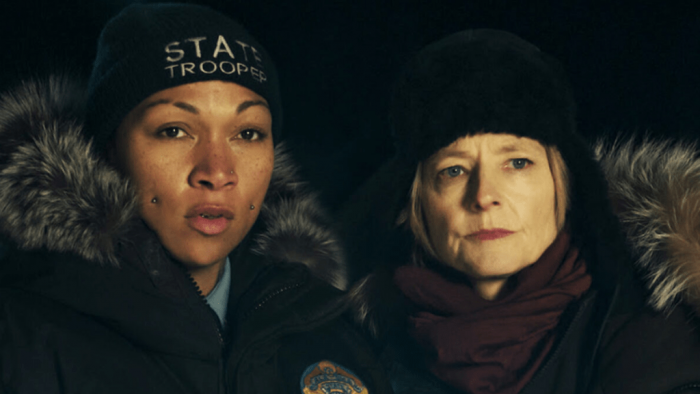

What Haunts the Detectives of 'Night Country'?
By Chris Revelle | TV | February 6, 2024 |
By Chris Revelle | TV | February 6, 2024 |

True Detective: Night Country on Max is a surprising marriage of detective stories and horror films that tells a complex, many-stranded tale of grotesque mass murder in Ennis, Alaska, the titular “night country” where the sun doesn’t come out for a month. It’s also about trauma.
It’s understandable if you saw the word “trauma” and rolled your eyes a little. Really? you might be mentally asking yourself. Another take about trauma on screen? The growing resentment for the concept is understandable in light of its ubiquity, reaching something of a critical mass with that Jamie Lee Curtis “trow-ma” press cycle for the new Halloween. Whatever its current value as a buzzword may be, trauma sits at the heart of horror storytelling. We treat it like it’s a new thing, but trauma being the ultimate monster in horror is arguably as old as the first scary story told. All horrifying tales are about trauma in some way; what is fear but the anticipation of trauma? What is a ghost but trauma remembered? This current season of True Detective, created by Issa López, mixes horror tropes and stylings with its gritty murder mystery, and in doing so, it approaches the traumas that shaped Liz Danvers (Jody Foster) and Evangeline Navarro (Kali Reis) into the troubled detectives they are now.
Liz Danvers is an unbelievable asshole. It’s a conclusion you’ll likely reach in the first episode as you watch her snap with particularly callous impatience at her Iñupiat step-daughter Leah or make horribly racist cracks about “spirit animals” to her Iñupiat colleague Evangeline. With her self-consciously prickly exterior and a resting face that one might describe as “hard,” Liz reminded me strongly of Marrianne “Mare” Sheehan from Mare of Easttown, especially in how she seems to have forgotten how to interact with her daughter without open conflict. Watching her, I had a two-toned emotional response: angry exasperation for how someone could treat their child so uncharitably and an overwhelming sadness at how someone could so thoroughly forget how to express love or affection.
After learning more about slain Iñupiat activist Annie K’s protests of the local mines, Liz finds Leah with temporary tavlugun (Iñupiat facial tattoo) on her chin. When she learns that Leah attended a protest against the mine, Liz becomes animated by an urgency and a fury to wash the tavlugun off. She tells Leah to never go to another protest. We see in this moment how terrified Liz is of losing Leah in the same way Annie K was lost and we see how this fear blinds her. Though she’s told that this is Leah’s way of connecting to her heritage in a way Liz can’t possibly facilitate, Liz doesn’t seem to hear it. All that matters is peeling off what she sees as targets that mark her daughter for death. Flashbacks to a noticeably kinder, smilier Danvers playing with her young son show us how the Liz we see has not always been.
There’s a family lost in Danvers’ past, painful enough to scar over with thickets of razor wire too thick to even comfort Leah who lost a father and a brother. The loss of a husband and a son, seemingly to the same casual cruelties Ennis inflicts upon its Iñupiat residents, seems to have radically changed Liz. The nuance that Night Country applies here is notable: we are at no point asked to choose whether Liz is a racist asshole or a mother trying to make the best of a hellacious situation. She’s both and more, each part of her as real and valid as the other. A lesser show would ask us to choose or choose for us, but here we’re given the different dimensions of Danvers as a conflicting, but human portrait.
Evangeline Navarro is a knight in tarnished armor: she pursues what she knows to be right even as every hurdle stands to trip her. Ennis is not a town that cares for its people and that seems especially so for the Iñupiat folk of the area. The local mines poison the water, turning it into sludge and stillbirths are becoming more common. Addressing any of these issues isn’t high on Ennis’ list, but violently silencing protestors seems to be. We see Navarro in flashback pounding on a door and attempting to arrest Annie for illegal use of a facility owned by the mine, one of many illustrations we get of the mine’s questionably legal influence on the town institutions. When she sees that Annie and her team are aiding another Iñupiat woman in her water birth, Navarro abandons her original mission and helps out. Navarro knows right and wrong deep into her bones as if justice itself whispers in her ear. It’s notable that she, unlike many cops fictional and real, recognizes where the letter of the law conflicts with actual do-gooding. This is a turning point for her as she becomes close with Annie, close enough to feel personally devastated when Annie is murdered.
It is not only that Navarro has lost a treasured friend, but she also lost one of the few precious connections she has to her culture. Evangeline and her sister Julia moved with their mother back to Ennis from Boston when their father became abusive. Then their mother was murdered before she could tell her daughters their Iñupiat names. This lack eats at Evangeline who is desperate for connection and community. Julia struggles against mental illness with visions that plagued their mother too and leans against Navarro. Evangeline has virtually no one to turn to for help, especially with Julia adazmantly against hospitals or medication. Navarro is made to feel like a lone island, something that keeps her emotionally withdrawn. Sweet local bartender Quavik seems to be her only respite and even then Navarro doesn’t fully take all her armor off.
Through all this, Evangeline remains fixed on her pursuit of Annie’s killer, even if she may be the only one. In other Iñupiat folks’ reactions to her questions, we see an exhaustion with how far Navarro has taken the investigation. We’re left to wonder if Navarro’s quest is as quixotic as all that and whether the continued pain the investigation could bring is worth it.
Night Country hints at a shared trauma between our two intrepid detectives. In the past, when Navarro was Danvers’ partner, the pair worked on a domestic abuse case. The abused wife repeatedly declined to press charges and went back to her husband until the time when the husband killed her. In Danvers’ telling, the husband killed himself, but we see in a flashback that he was very much alive when they show up, even whistling a tune. Either Navarro or Danvers shot him and the other participated in a cover-up, resulting in Danvers never wanting to work with Navarro again. The killing appears to haunt them both and it’s unclear what’s more disturbing to them: that they took justice into their own hands or that it felt right to do so.
← Review: 'Exhibiting Forgiveness' Is a Sundance Best | Madonna Gets A Kick Out Of Fan's Shady Lady Gaga Sign →
More Like This
Charming Ramy Youssef Mines the Comedy of NPR's Tiny Desk Concerts as Host of 'SNL'
Spoilers: Netflix’s Korean Comedy 'Chicken Nugget' Is Getting Review-Bombed Over A Single Joke
How 'The Regime' and 'Palm Royale' Complicate Their Genres
Jenna Lyons Has Conditions For ‘Real Housewives’ Return
This Week On ‘Selling Sunset’: Irreconcilable Differences

Jenna Lyons Has Conditions For ‘Real Housewives’ Return
This Week On ‘Selling Sunset’: Irreconcilable Differences
Huey Lewis Was Inspired By 'Mamma Mia' For His Next 'Career Event'
Paramount+ Is Getting Cues From David Zaslav
Yorgos Lanthimos Reteams with Emma and Viggo Goes West In Three Trailers
Kristen Stewart Will Never Make an ‘Algorithmic’ Marvel Movie
More Like This
Charming Ramy Youssef Mines the Comedy of NPR's Tiny Desk Concerts as Host of 'SNL'
Spoilers: Netflix’s Korean Comedy 'Chicken Nugget' Is Getting Review-Bombed Over A Single Joke
How 'The Regime' and 'Palm Royale' Complicate Their Genres
Jenna Lyons Has Conditions For ‘Real Housewives’ Return
This Week On ‘Selling Sunset’: Irreconcilable Differences
Reviews